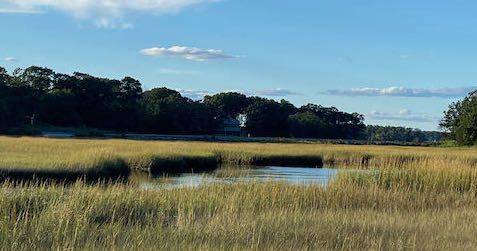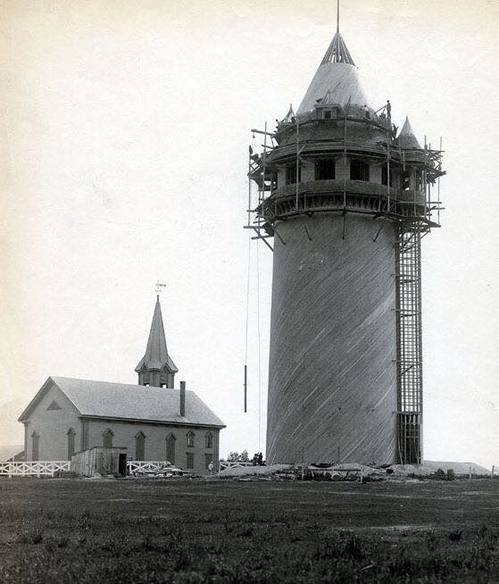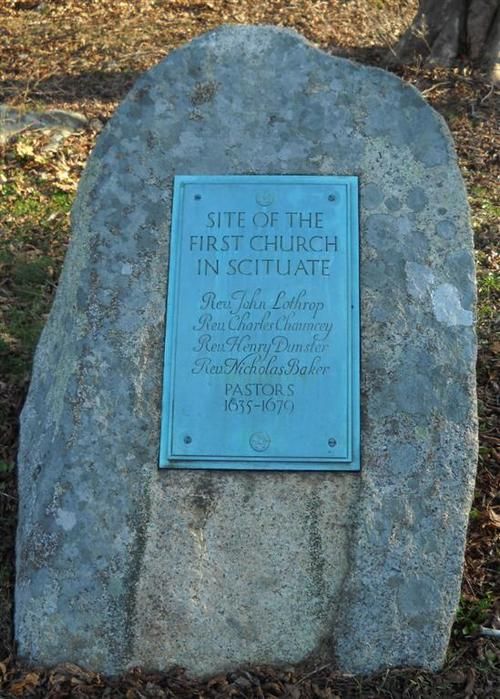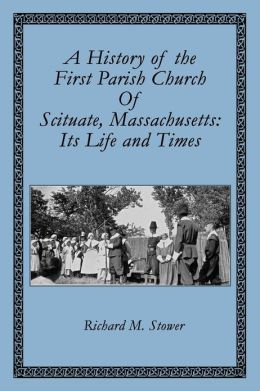The History of First Parish
The founding church of Scituate, est. 1634

Land Acknowledgement
We meet today on the traditional and ancestral land of the Massachusett and the Wampanoag peoples, the original inhabitants of what is now known as Scituate. We are mindful that for the Wampanoag and Massachusett peoples -- past, present, and future -- this land is sacred.
As we read, hear, or recite these words, let us:
- Acknowledge with respect and admiration the Massachusett and the Wampanoag peoples,
the traditional custodians of the land where our church is located. - Recognize that they lived here and cared for this land over countless generations.
- Remember that this land was stolen from them by European colonizers.
- Honor the resilience of the Indigenous Peoples who continue to live in this region despite
the legacy of colonialism that still impacts them and this land. - Strive to increase our understanding of Indigenous Peoples to the life of this region
and to support them and the causes that are important to them. - Celebrate the continuing contributions of Indigenous Peoples to the life of this region.
- Understand that we borrow the earth from our children and work to become better stewards of it.


Our Minister Emeritus, Richard Stower, researched this history of First Parish Church using sources in Scituate, London, and Kent. It won a Congregational History prize from the UU HHS.
A History of the First Parish Church of Scituate, Massachusetts: Its Life and Times
By Richard Stower, 2013
ISBN 978-0-985-82825-7
Order at Barnes & Noble
A History of the First Parish Church of Scituate, Massachusetts: Its Life and Times
By Richard Stower, 2013
ISBN 978-0-985-82825-7
Order at Barnes & Noble

The "Men of Kent": Hatherly, Cudworth, Gilson, Turner, Cobb, and Foster
First Parish Church of Scituate is over 375 years old. Its beginnings stem from a group of Nonconformists in London, who started meeting in London in 1616, led by the Rev. Henry Jacob. He was succeeded in 1624 by the Rev. John Lothrop, a former rector in the Church of England. Discovered worshipping clandestinely in 1632, forty two members of the congregation were arrested and jailed.
After two years in jail, Rev. Lothrop was released from jail with the proviso that he leave England forever. With a majority of the members of his congregation, he sailed for New England and arrived in Scituate in September, 1634. A few months later, Rev. Lothrop and about a dozen people gathered together and made a covenant with each other, forming what is now known as the First Parish Unitarian Universalist Church of Scituate.
The surnames of some of these "pillars" of the church may be familiar to Scituate residents: Hatherly, Cudworth, Gilson, Turner, Cobb, and Foster. A small log cabin on Meeting House Lane served as the first church. The site is marked today by a monument that lists the early members of the parish, "The Men of Kent," and by gravestones from the 17th century.
After two years in jail, Rev. Lothrop was released from jail with the proviso that he leave England forever. With a majority of the members of his congregation, he sailed for New England and arrived in Scituate in September, 1634. A few months later, Rev. Lothrop and about a dozen people gathered together and made a covenant with each other, forming what is now known as the First Parish Unitarian Universalist Church of Scituate.
The surnames of some of these "pillars" of the church may be familiar to Scituate residents: Hatherly, Cudworth, Gilson, Turner, Cobb, and Foster. A small log cabin on Meeting House Lane served as the first church. The site is marked today by a monument that lists the early members of the parish, "The Men of Kent," and by gravestones from the 17th century.
Growth, Schisms, and Daughter Churches
Over a span of some 60 years and the succession of six ministers, First Parish was the scene of considerable theological dissention. The principle points were, first, baptism and later, the Unitarian/Trinitarian schism. These disagreements led to the separation, at three times, of a major portion of First Parish's members to form new churches.
Early on, dissent over baptism divided the parish and in 1639 Rev. Lothrop led an exodus of a majority of the congregation to Barnstable on Cape Cod. His successor, Charles Chauncy, another Anglican minister, was described as a spirited, impatient man. His staunch support for baptism by immersion provoked another defection which led to the founding of a church in South Scituate (now Norwell). Rev. Chauncy served until 1654, when he became the second president of Harvard University; he held this post until his death in 1672.
The first president of America's first university, Henry Dunster, succeeded Rev. Chauncy as the third pastor of First Parish, Scituate. Rev. Dunster was succeeded by Nicholas Baker, who in turn, was followed by Jeremiah Cushing of Hingham, the first pastor of the parish who was born in America. Rev. Baker was the first of many ministers in the parish who were trained at Harvard University.
Conflicts between orthodox and liberal factions became intense in the late 18th century, culminating in the third removal of one-half of the congregation. This time the departing members of the congregation stayed close at hand, removing themselves around the corner to establish the First Trinitarian Church of Scituate (currently on Country Way) in 1825. As one wag has put it, "the Trinitarians kept the faith, while the Unitarians kept the furniture!"
Early on, dissent over baptism divided the parish and in 1639 Rev. Lothrop led an exodus of a majority of the congregation to Barnstable on Cape Cod. His successor, Charles Chauncy, another Anglican minister, was described as a spirited, impatient man. His staunch support for baptism by immersion provoked another defection which led to the founding of a church in South Scituate (now Norwell). Rev. Chauncy served until 1654, when he became the second president of Harvard University; he held this post until his death in 1672.
The first president of America's first university, Henry Dunster, succeeded Rev. Chauncy as the third pastor of First Parish, Scituate. Rev. Dunster was succeeded by Nicholas Baker, who in turn, was followed by Jeremiah Cushing of Hingham, the first pastor of the parish who was born in America. Rev. Baker was the first of many ministers in the parish who were trained at Harvard University.
Conflicts between orthodox and liberal factions became intense in the late 18th century, culminating in the third removal of one-half of the congregation. This time the departing members of the congregation stayed close at hand, removing themselves around the corner to establish the First Trinitarian Church of Scituate (currently on Country Way) in 1825. As one wag has put it, "the Trinitarians kept the faith, while the Unitarians kept the furniture!"
A notable visitor to First Parish Church of Scituate in the 19th century was Henry David Thoreau, who courted Ellen Sewall, the daughter of First Parish's 12th minister, Edmund Sewall. She eventually rejected his marriage proposal; he later retreated to the woods of Concord...
